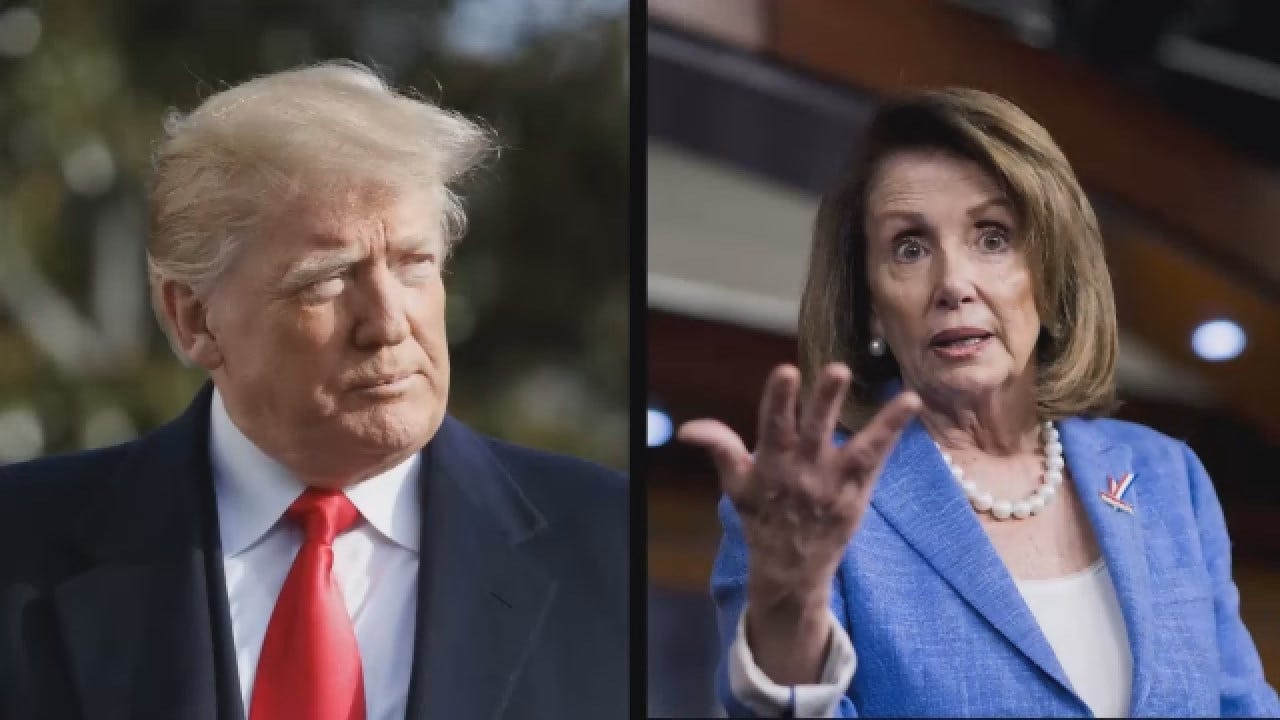CBS News Poll: Most Oppose Trump Declaring National Emergency For Wall Funding
Sixty-six percent of Americans overall say President Trump should not declare a national emergency if Congress does not fund a border wall, although most Republicans (73 percent) think he should.Sunday, February 3rd 2019, 4:34 pm
Sixty-six percent of Americans overall say President Donald Trump should not declare a national emergency if Congress does not fund a border wall, although most Republicans (73 percent) think he should.
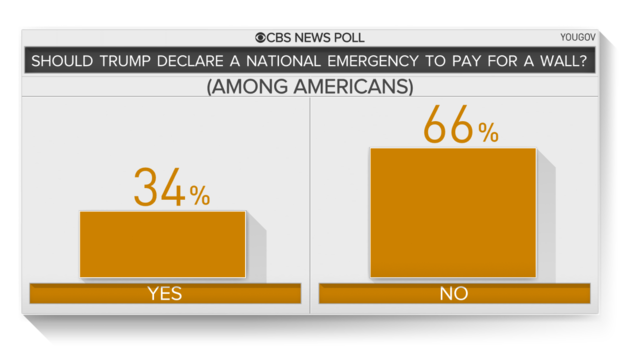
If government funding runs out on Feb. 15 and there's still an impasse over wall funding, Americans don't want either side to force another shutdown.
Seventy-three percent of Americans want Trump to continue negotiating while keeping the government open, rather than demand wall funding if that forces a shutdown. A similar number (75 percent) say congressional Democrats should also continue negotiating, rather than deny funding in a move that might force a shutdown.
But there are partisan differences underlying these views. Republicans are split on what Trump should do on Feb. 15 if there is no deal. Fifty percent of Republicans say he should demand funding for a wall, even if it means another shutdown, while 50 percent think he should continue to negotiate while keeping the government open.
Most Democrats (65 percent) want their own party in Congress to continue negotiating with the government open, while a third think they should refuse to fund a wall if it means another government shutdown.
North Korea
Few Americans believe North Korea has reduced its nuclear program since the last Trump-Kim summit, and most don't think there should be another summit now. The White House has said a second summit will take place at the end of February.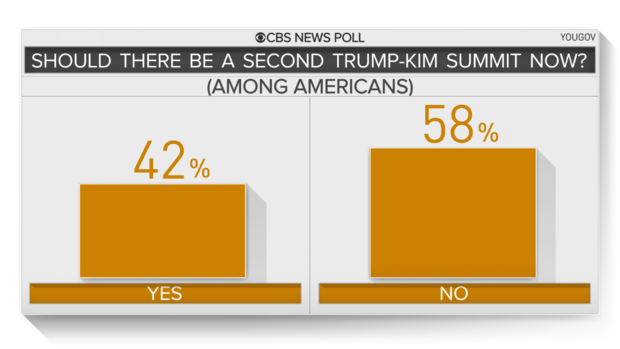
Fifty-seven percent of Americans, including most Republicans, say North Korea has not changed its nuclear program since the last summit. Just 17 percent think North Korea has reduced its program and 25 percent believe it has expanded it. Fifty-eight percent of Americans don't think there should be another summit right now, while 42 percent think there should be. Partisan splits drive this as well: most Democrats (77 percent) and independents (57 percent) don't want a second meeting, while seven in 10 Republicans do.
But fewer now see North Korea as a threat needing U.S. military action. Just 16 percent see North Korea as a threat that would require U.S. military action soon, down from 29 percent in 2017. Most think the country can be contained.
Russia investigation
Republicans continue to see the investigation as a "witch hunt" and believe Mueller is conducting it unfairly. Democrats see a critical matter to national security. Most Americans say the Russia investigation is either a critical matter of national security (43 percent) or at least a serious one (22 percent). A third, including 73 percent of Republicans, call it a political witch hunt and a distraction.
Fifty-four percent of Americans think special counsel Robert Mueller is conducting the investigation fairly, while 46 percent believe he's conducting it unfairly, including most Republicans who say so.
State of the country
Americans remain upbeat about the economy and give Trump credit, but are sour on the state of the country, overall. Seventy-seven percent say Trump's policies are at least somewhat responsible for an economy that most feel is doing well.
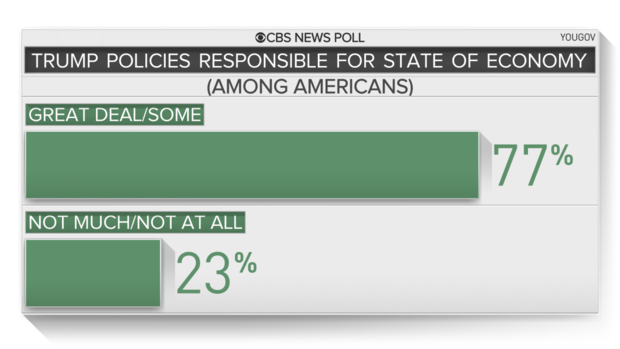
Asked how the country overall is doing compared to a year ago, more say the country is worse off (50 percent) than better (28 percent). Republicans are more positive than Democrats. (Other recent CBS News polls show that for those who think the country is heading in the wrong direction, the state of politics and government is stated as the top reason why.)
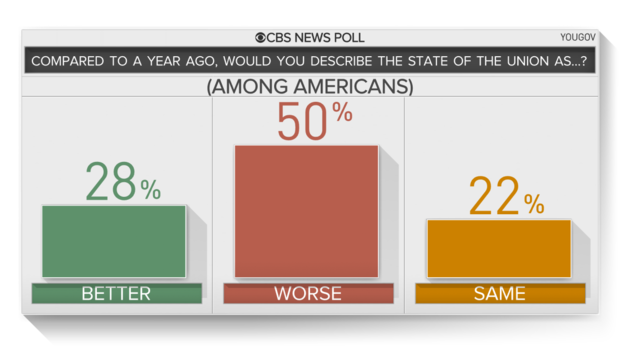
Trump's presidency: What he has and hasn't done
Among Americans overall, fewer than half think Mr. Trump brought back manufacturing jobs, specifically (45 percent) made the borders more secure (38 percent) or reduced the influence of lobbyists and big donors (29 percent). Only 35 percent of Americans have a lot or some confidence in the president's ability to make deals with Congress.
Republicans differ and generally feel he has done these things, but to varying degrees: Republicans overwhelmingly feel he has brought back jobs (89 percent) and made the borders more secure (78 percent), more so than having reduced the influence of lobbyists (60 percent) or been a role model (61 percent of Republicans).
Just a third of the public (35 percent) say the president has tried to unify Americans; 65 percent feel he hasn't. Only 27 percent say he has been a role model.
The CBS News survey is conducted by YouGov using a nationally representative sample of 1,596 U.S. residents interviewed online between January 28-31, 2019. This sample was weighted according to gender, age, race, and education based on the American Community Survey, conducted by the U.S. Bureau of the Census, as well as 2016 Presidential vote and registration status. Respondents were selected from YouGov's opt-in panel to be representative of all U.S residents. The margin of error is 2.6%.
More Like This
November 13th, 2024
October 28th, 2024
October 17th, 2024
Top Headlines
November 22nd, 2024
November 22nd, 2024
November 22nd, 2024
November 22nd, 2024

